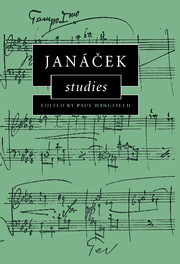Book contents
- Frontmatter
- Contents
- Preface
- 1 Expressive sources and resources in Janáček's musical language
- 2 ‘Nothing but pranks and puns’: Janáček's solo piano music
- 3 Narrative in Janáček's symphonic poems
- 4 Evasive realism: narrative construction in Dostoyevsky's and Janáček's From the House of the Dead
- 5 Direct discourse and speech melody in Janáček's operas
- 6 Kundera's eternal present and Janáček's ancient Gypsy
- 7 Janáček's folk settings and the Vixen
- 8 Janáček's operas in Australia and New Zealand: a performance history
- 9 Janáček's Moravian publishers
- 10 Janáček, musical analysis, and Debussy's ‘Jeux de vagues’
- Index
9 - Janáček's Moravian publishers
Published online by Cambridge University Press: 22 September 2009
- Frontmatter
- Contents
- Preface
- 1 Expressive sources and resources in Janáček's musical language
- 2 ‘Nothing but pranks and puns’: Janáček's solo piano music
- 3 Narrative in Janáček's symphonic poems
- 4 Evasive realism: narrative construction in Dostoyevsky's and Janáček's From the House of the Dead
- 5 Direct discourse and speech melody in Janáček's operas
- 6 Kundera's eternal present and Janáček's ancient Gypsy
- 7 Janáček's folk settings and the Vixen
- 8 Janáček's operas in Australia and New Zealand: a performance history
- 9 Janáček's Moravian publishers
- 10 Janáček, musical analysis, and Debussy's ‘Jeux de vagues’
- Index
Summary
Janáček's first published work was the brief unaccompanied motet Exaudi Deus, completed in 1875 and printed as part of a musical supplement to the Prague-based Cecilian movement periodical Cecilia in 1877. After this debut, at the age of twenty-three, the publication of Janáček's music was centred for more than three decades on his home town of Brno. The Moravian capital played host to some distinguished musicians in the second half of the nineteenth century. Concerts were given by Clara Schumann (1859), Anton Rubinstein (1867), Brahms and Joachim (1867), the Hellmesberger Quartet (1882), von Bülow as both conductor and soloist with the Meiningen Orchestra (1884), the ten-year-old Josef Hofmann (1886, a concert reviewed by Janáček), the Rosé Quartet (1888), Ysaÿe (1890), Kreisler (1895), Richter conducting the Vienna Philharmonic (1896), Dvořák conducting the Czech Philharmonic (1897), and many others.
Janáček himself was perhaps the most trenchant critic of local musical life in Brno, particularly of Czech-run institutions, compared with the wealthier German-run organisations. He began one of his reviews (Hudebnílisty, 24 February 1886) with the uncompromising assertion that there was ‘Complete stagnation at our opera house!’, continuing with a vigorous polemic on what was needed to raise standards: better acting, sparing use of the prompter, and the quest for ‘perfection’ in the chorus and orchestra.
- Type
- Chapter
- Information
- Janácek Studies , pp. 170 - 182Publisher: Cambridge University PressPrint publication year: 1999

